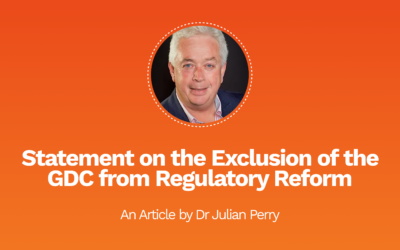In light of the government’s recently announced and highly-anticipated NHS dentistry ‘recovery plan,’ purportedly aimed at alleviating longstanding challenges for NHS dental practices, we wish to share Densura’s perspective on why dentists may be reluctant to pursue employment within the NHS.
We spoke to Julian Perry, not only one of Densura’s dento-legal advisers, we’re proud to say, but also a highly-renowned figure in the dental industry. Here’s what he had to say were the main concerns:
NHS Dental concerns for UK dentists
“Firstly, low reimbursement rates: The fees paid by the NHS for dental treatments are often inadequate. This can make it financially challenging for dental practices, particularly when considering overhead costs and running a sustainable business. NHS dental practices are not funded in the same way medical practices are.
Secondly, administrative burden: NHS dental practices are subject to a vast range of administrative requirements, including paperwork, audits, and compliance with NHS regulations. Regulation is now overly bureaucratic and a significant burden, not to mention cumbersome and time-consuming. And dentists must put all their time into complying for free!
Treatment options: The NHS dental contract pretends that all treatments are available. This is simply not true. Many treatments involving laboratory work cost the dentist more to have made than the fee they are paid. Dentists effectively work for a negative amount. This is simply unsustainable and those offering private treatment make up the shortfall in private fees.
High demand and low availability: In some areas, there may be high demand for NHS dental services, leading to long waiting times for appointments. This can put pressure on dentists and their staff, affecting their ability to provide timely care and potentially leading to patient dissatisfaction – and these days, anger and physical assault. It’s not the dentist’s fault. Dentists are trying to help patients!
“This can put pressure on dentists and their staff, affecting their ability to provide timely care and potentially leading to patient dissatisfaction – and these days, anger and physical assault. It’s not the dentist’s fault. Dentists are trying to help patients!”
Recruitment and retention challenges: Recruiting and retaining dentists to work within the NHS can be challenging, particularly in certain geographic areas or specialties where there are workforce shortages. There are 11,500 or so practices in the UK and around 42,000 dentists (33,000 FTE). Principal dentists often have to pay more than can be afforded to the associates to get dentists to work in certain areas of the country. Add Brexit to this where we lost a significant number of the dental workforce overnight and the problem is compounded 10 fold.
How Densura can lend support in the ongoing NHS dental topic
At Densura we are committed to our dentists. This goes beyond the provision of indemnity; it’s about being supportive through difficult times and using our resources and numbers to lobby for what’s right – great patient care and a fair deal for those providing it.



